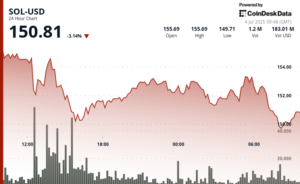BlackRock’s Spot Bitcoin ETF: A Revolutionary Milestone in Asset Management
BlackRock’s spot Bitcoin exchange-traded fund (ETF), known as IBIT, has emerged as a groundbreaking player in the financial market just 18 months after its launch. According to Bloomberg’s senior ETF analyst, Eric Balchunas, IBIT has quickly climbed to become BlackRock’s third-highest revenue-generating ETF. With an impressive $76 billion in assets under management (AUM) and a low expense ratio of 0.25%, it is projected to generate approximately $191 million in annual revenue. This rapid ascent is indicative of the growing appetite for regulated cryptocurrency investments and highlights the evolving landscape of asset management.
Surpassing Expectations
Michael Saylor, Strategy Chairman at BlackRock, has expressed optimism regarding IBIT’s future, suggesting that it may soon dethrone the iShares Russell 1000 Growth ETF (IWF) as the company’s number one revenue generator. Currently, IBIT is not far behind IWF, only $9 billion in assets away from overtaking it. The growing competition between these two ETFs underscores the increasing relevance of Bitcoin in investment portfolios. Balchunas has remarked on IBIT’s exceptional performance, emphasizing that it is "just another insane stat for a 1.5-year-old ETF."
Instant Success and Historical Significance
Launched in January 2024, alongside several other spot Bitcoin ETFs approved by the U.S. Securities and Exchange Commission (SEC), IBIT made history by becoming the fastest ETF to cross $2 billion in inflows within days of its launch. This rapid growth reflects a seismic shift in investor sentiment toward cryptocurrencies, as traditional market leaders were unable to match this pace. By its six-month milestone, IBIT had already surpassed $50 billion in assets, showcasing a phenomenal demand trajectory that many had not anticipated.
Institutional and Retail Demand
IBIT’s accelerated growth can be attributed to both institutional and retail interest in Bitcoin as a legitimate asset class. With increasing adoption among financial advisors, corporate treasuries, and hedge funds, the fund stands out as a liquid, regulated option for obtaining Bitcoin exposure. This reflects a growing trend where traditional investment vehicles are incorporating cryptocurrencies into their portfolios, akin to the way gold ETFs gained acceptance in the past two decades. The demand for Bitcoin is shifting from speculative trading to a more thoughtful integration into investment strategies.
Competitive Landscape
In terms of revenue generation, IBIT currently ranks behind only two other BlackRock ETFs — IWF, which generates approximately $211 million annually, and the iShares MSCI EAFE ETF (EFA), with an estimated $207 million. As IBIT continues to gain traction, it has the potential not only to eclipse these ETFs but to reshape the narrative around cryptocurrency investments. The ETF market is rapidly evolving, and products like IBIT are at the forefront, setting new standards for what is achievable in asset management.
Conclusion: A New Era of Investment
IBIT’s meteoric rise is not just a testament to BlackRock’s strategic vision but is also reflective of a broader shift in how cryptocurrencies are viewed within the financial ecosystem. As more investors endorse regulated Bitcoin exposure, the time may come when traditional assets like stocks and bonds are complemented by cryptocurrencies in diversified portfolios. The trajectory of IBIT and similar funds could very well usher in a new era of investment where digital assets are commonplace on Wall Street, further solidifying Bitcoin’s position as a vital component in modern finance.

















